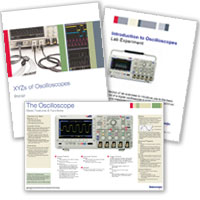
Tektronix XYZs of Oscilloscopes and Oscilloscope Reference Kit
New Tektronix Oscilloscopes from TestEquity >>
 XYZs of Oscilloscopes Primer (pdf, 3.2M)
XYZs of Oscilloscopes Primer (pdf, 3.2M)
Oscilloscopes enable you to "see" events that change over time. Oscilloscopes are indispensable tools for anyone designing, manufacturing or repairing electronic equipment. In today's fast-paced world, engineers need the best tools available to solve their measurement challenges quickly and accurately. As the eyes of the engineer, oscilloscopes are the key to meeting today's demanding measurement challenges. The concepts presented in this primer will provide you with a good starting point in understanding oscilloscope basics and operation.
Oscilloscope Reference Poster (pdf, 232K)
This poster visually shows the basic features and functions of the oscilloscope including tips for capturing your signal and advanced triggering. Easy to print on 11x17 paper for an ideal reference to post in your lab, office or anywhere you use your oscilloscope.
Fundamentals of Oscilloscopes Lab (pdf, 207K)
Step-by-step guide covering oscilloscope operation and common electronic measurements.
Pocket Guide to Oscilloscopes (pdf, 847K)
This pocket-sized guide explains fundamental oscilloscope concepts, including how an oscilloscope works and tips for capturing your signal. Easy, 2-fold assembly for a helpful, quick reference guide to your oscilloscope.
XYZs of Oscilloscopes Primer (pdf, 3.2M)
Table of Contents
Introduction
Signal Integrity
The Significance of Signal Integrity
Why is Signal Integrity a Problem?
Viewing the Analog Origins of Digital Signals
The Oscilloscope
Understanding Waveforms and Waveform Measurement
Types of Waves
Sine Waves
Square and Rectangular Waves
Sawtooth and Triangle Waves
Step and Pulse Shapes
Periodic and Non-periodic Signals
Synchronous and Asynchronous Signals
Complex Waves
Constellation Diagrams
Waveform Measurements
Frequency and Period
Voltage
Amplitude
Phase
Waveform Measurements with Digital Oscilloscopes
Types of Oscilloscopes
Digital Oscilloscopes
Digital Storage Oscilloscopes
Digital Phosphor Oscilloscopes
Digital Sampling Oscilloscopes
The Systems and Controls of an Oscilloscope
Vertical System and Controls
Position and Volts per Division
Input Coupling
Bandwidth Limit
Bandwidth Enhancement
Horizontal System and Controls
Acquisition Controls
Acquisition Modes
Types of Acquisition Modes
Starting and Stopping the Acquisition System
Sampling
Sampling Controls
Sampling Methods
Real-time Sampling
Equivalent-time Sampling
Position and Seconds per Division
Time Base Selections
Zoom
XY Mode
Z Axis
XYZ Mode
Trigger System and Controls
Trigger Position
Trigger Level and Slope
Trigger Sources
Trigger Modes
Trigger Coupling
Trigger Holdoff
Display System and Controls
Other Oscilloscope Controls
Math and Measurement Operations
The Complete Measurement System
Probes
Passive Probes
Active and Differiential Probes
Probe Accessories
Performance Terms and Considerations
Bandwidth
Rise Time
Sample Rate
Waveform Capture Rate
Record Length
Triggering Capabilities
Effective Bits
Frequency Response
Vertical Sensitivity
Sweep Speed
Gain Accuracy
Horizontal Accuracy (Time Base)
Vertical Resolution (Analog-to-digital Converter)
Connectivity
Expandability
Ease-of-use
Probes
Operating the Oscilloscope
Setting Up
Ground the Oscilloscope
Ground Yourself
Setting the Controls
Using Probes
Instrument Calibration
Connecting the Ground Clip
Compensating the Probe
Oscilloscope Measurement Techniques
Voltage Measurements
Time and Frequency Measurements
Pulse Width and Rise Time Measurements
Phase Shift Measurements
Other Measurement Techniques
Written Exercises
Part I
Vocabulary Exercises
Application Exercises
Part II
Vocabulary Exercises
Application Exercises
Answer Key
Glossary